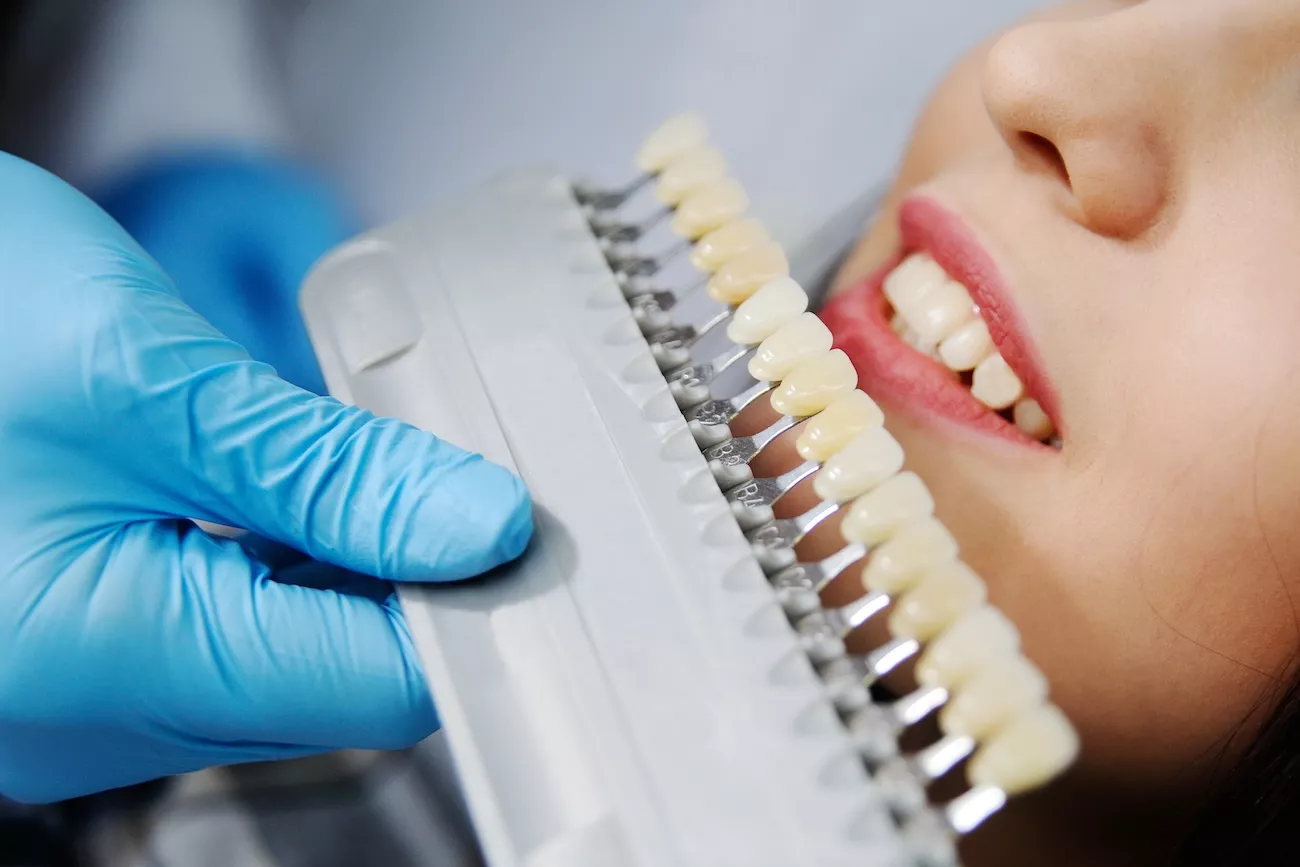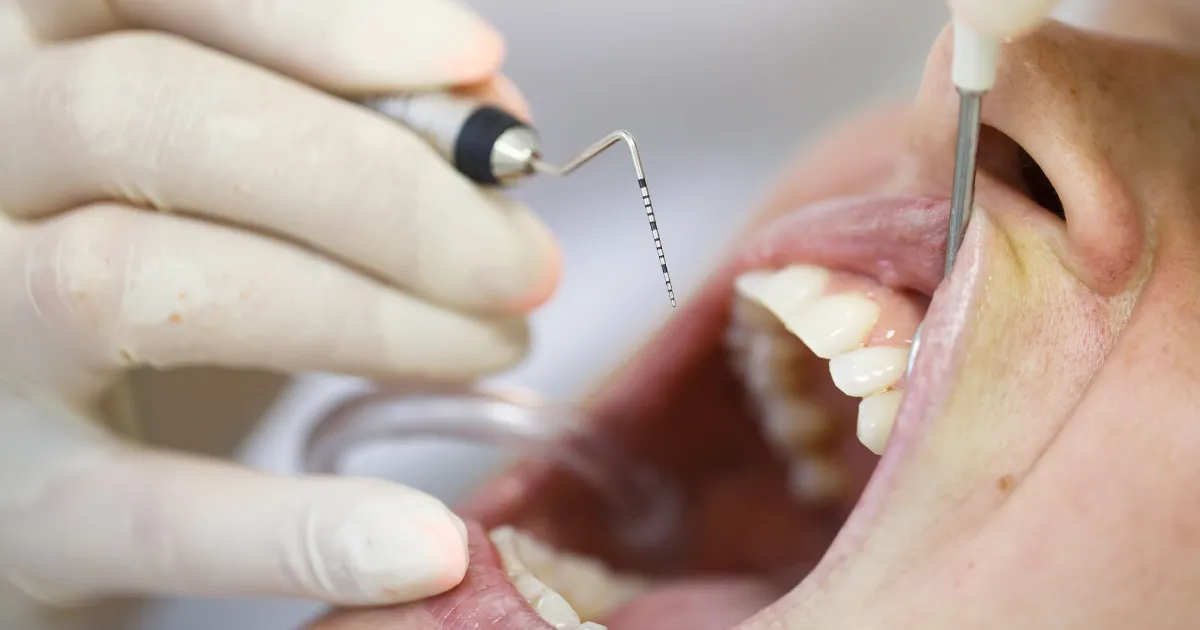If you’ve been told you need a deep cleaning or periodontal therapy, it’s normal to wonder what the difference is and which one is right for you.
Periodontal therapy treats gum disease below the gum line and helps protect your smile and your overall health.
What Is Periodontal Therapy?
Periodontal therapy is a collection of treatments designed to control gum infection, shrink pocket depths, and stabilise the tissues that hold your teeth in place. It goes beyond a quick polish. Depending on your diagnosis, therapy can include:
- Comprehensive periodontal charting and X-rays
- Non-surgical root surface debridement (deeper than routine hygiene)
- Local antimicrobials or antibiotics when indicated
- Bite adjustments (if trauma from occlusion is inflaming gums)
- Soft-tissue surgery in advanced cases (e.g., flap surgery, grafts)
- Long-term periodontal maintenance visits
Signs You May Need Periodontal Therapy
- Red, swollen, or bleeding gums
- Persistent bad breath (halitosis)
- Gum recession or teeth that look “longer”
- Loose teeth or shifting bite
- Pus or tenderness at the gum line
- Deep pocket depths (measured with a probe), bone loss on X-rays
These signs suggest the infection has moved beyond simple gingivitis into periodontitis and needs focused care.
What Is a Deep Cleaning (Scaling & Root Planing)?
A deep cleaning, often called scaling and root planing, is a non-surgical procedure that removes plaque and tartar from the tooth surfaces above and below the gum line. Your clinician numbs the area, scales away buildup, and smooths the roots so the gums can reattach. It’s typically delivered in quadrants (upper right, upper left, lower right, lower left).
When a “Regular Clean” Isn’t Enough
A standard “scale and polish” is great for gingivitis and maintenance, but once pockets deepen and calculus accumulates below the gum line, a deep cleaning is needed to disrupt bacteria. If pockets remain deep or bone loss is present, you may need periodontal therapy rather than just a one-off deep clean.
Goals, Tools, and Treatment Stages
- Deep cleaning targets bacterial deposits.
- Periodontal therapy targets the disease process, combining deep cleaning with tailored steps and maintenance to keep results stable.
Who Needs Which Treatment?
- Deep cleaning is best when pockets are borderline and there’s little to no mobility.
- Periodontal therapy is recommended with pockets ≥4–5 mm, bleeding on probing, bone loss, or tooth mobility.
- Risk factors like smoking, diabetes, dry mouth, or a family history of gum disease tip the balance toward comprehensive therapy and closer maintenance.
Benefits of Periodontal Therapy (Short & Long Term)
- Reduces bleeding, swelling, and bad breath
- Helps shrink pocket depths and improve attachment
- Lowers the risk of tooth loss and costly future treatment
- Supports better blood-sugar control in diabetes and reduces chronic inflammation that can affect overall health
Risks, Limits, and When Periodontal Therapy Alone Isn’t Enough
Most people do very well with non-surgical care. However, some sites don’t respond due to deep defects, root anatomy, smoking, or systemic conditions. In that case, periodontal surgery (e.g., flap surgery, regenerative procedures, or gum grafts for recession) may be advised to access, disinfect, and reshape areas that can’t be cleaned predictably.
Does Periodontal Therapy Hurt? Pain Control & Comfort Options
With modern local anaesthetics, most people feel pressure and vibration but not sharp pain. Sensitive areas can be numbed further. After treatment, expect mild tenderness or temperature sensitivity for a few days. Over-the-counter analgesics, desensitising toothpaste, and lukewarm saltwater rinses usually help.
Aftercare & Recovery Timeline
- First 24–48 hours: Slight soreness; eat soft foods and avoid very hot or spicy meals.
- Days 3–7: Gums begin to feel firmer; bleeding reduces.
- Weeks 2–6: Pockets may shallow as swelling subsides; breath freshness improves.
Periodontal Therapy Aftercare: Daily Routine
- Brush twice daily with a fluoride toothpaste (electric brushes work well).
- Interdental cleaning every day, interdental brushes or floss.
- Use a clinician-recommended antimicrobial mouthwash for the short term if advised.
- Quit smoking and moderate alcohol; both slow healing.
- Keep 3–4 month maintenance recalls to protect your results.
Want a reliable overview of gum disease? See the NHS guide: NHS – Gum Disease.
Home Prevention That Protects Your Results
- Keep plaque low with effective brushing and interdental brushes that fit your spaces.
- Choose a toothpaste for sensitive teeth if roots feel tender after treatment.
- Eat a balanced diet rich in vitamin C and avoid frequent sugary snacks.
- Replace brush heads every 3 months (or after illness).
- Don’t skip maintenance - periodontal therapy is only as successful as the follow-up.
Periodontal Therapy in Redditch: Why Choose Kingfisher Dental
At Kingfisher Dental, we deliver personalised care - from thorough diagnosis and deep cleaning to comprehensive periodontal therapy and maintenance. You’ll get clear explanations, gentle treatment, and a prevention-first plan that fits your lifestyle. Our clinicians use evidence-based protocols to help you keep your natural teeth for life.
Ready for Healthier Gums? Contact Kingfisher Dental
If you’re comparing periodontal therapy vs deep cleaning and want a clear, personalised plan, we’re here to help. Call our friendly team or book online to schedule your assessment at Kingfisher Dental in Redditch. Let’s calm the infection, protect your smile, and keep your gums healthy, starting today.


















